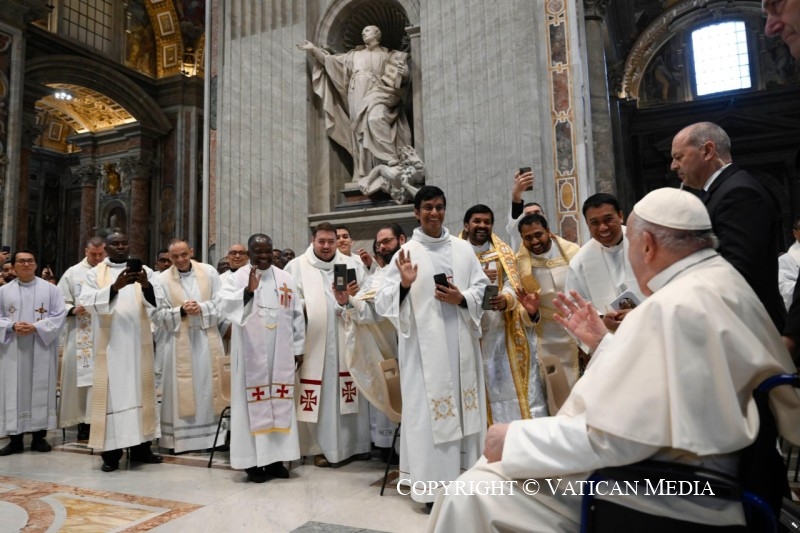Holy Thursday: Pope tells priests that God does not ask us for judgments, but tears for those who are far away
Francis dedicated the homily of the Chrism Mass, which he delivered personally in the Vatican Basilica, to Peter's tears. In the life of the spirit, “if we fail to weep, we regress and grow old within, whereas those” who “wonder in the presence of God, grow and mature.” In the afternoon, he will visit the women’s section of the Rebibbia prison to celebrate the Mass in Coena Domini and take part in the rite of the Washing of the Feet.
Vatican City (AsiaNews) – Pope Francis led the Chrism Mass this morning, Holy Thursday, dedicated to priests. In his homily, he said: “from us, his shepherds, the Lord desires not harshness but love, and tears for those who have strayed.”
On the day celebrating the priesthood, remembering the institution of the Eucharist, the pontiff was able to personally deliver a long homily before the priests of the Diocese of Rome, who came together for the rite in which the sacred oils used in administering the sacraments are received in every church around the world.
After this morning’s service, the pontiff is set to visit this afternoon the women's section of Rome’s Rebibbia prison, to celebrate together with the inmates and prison staff the Mass in Coena Domini with the rite of the Washing of the Feet.
The gaze at God's mercy, greater than any weakness, bridged these two moments, which Francis put at the centre of his homily at the Chrism Mass.
Reflecting on Peter's tears on the night when Jesus was betrayed, he said that such “tears [. . .], rising up from a wounded heart, liberated him from his false notions and his self-assurance. Those bitter tears changed his life.”
This is the horizon the pope pointed to in his address to fellow priests, inviting them to discover anew, “an aspect of the spiritual life that has been somewhat neglected, yet remains essential. Even the word I am going to use today is somewhat old-fashioned, yet well worthy of reflecting on. That word is compunction.”
This word means "a piercing of the heart" that transforms lives. “That is what compunction is: not a sense of guilt that makes us discouraged or obsessed with our unworthiness, but a beneficial ‘piercing’ that purifies and heals the heart. Once we recognize our sin, our hearts can be opened to the working of the Holy Spirit, the source of living water that wells up within us and brings tears to our eyes.”
“Those who are willing to be ‘unmasked’ and let God’s gaze pierce their heart receive the gift of those tears, the holiest waters after those of baptism.”
This “does not mean weeping in self-pity, as we are so often tempted to do. As, for example, [. . .] when we take an odd and morbid pleasure in brooding over wrongs received, feeling sorry for ourselves, convinced that we were not treated as we deserved or fearing that the future will hold further unpleasant surprises.”
On the contrary, weeping for ourselves “means seriously repenting for saddening God by our sins; recognizing that we always remain in God’s debt, admitting that we have strayed from the path of holiness and fidelity to the love of the One who gave his life for us.”
For Francis, priests should ask themselves whether, as the years go by, the tears increase or decrease. “In nature,” he explained, “the older we become, the less we weep. In the life of the spirit, however, we are asked to become like children (cf. Mt 18:3)”.
Indeed, “if we fail to weep, we regress and grow old within, whereas those whose prayer becomes simpler and deeper, grounded in adoration and wonder in the presence of God, grow and mature. They become less attached to themselves and more attached to Christ”, thus becoming “poor in spirit”.
“So it is that those who feel compunction of heart increasingly feel themselves brothers and sisters to all the sinners of the world, setting aside airs of superiority and harsh judgments, and filled with a burning desire to show love and make reparation.”
Only this way can the difficult situations the priest encounters, such as lack of faith or suffering “make us respond not with condemnation, but with perseverance and mercy. How greatly we need to be set free from harshness and recrimination, selfishness and ambition, rigidity and frustration, in order to entrust ourselves completely to God, and to find in him the calm that shields us from the storms raging all around us! Let us pray, intercede and shed tears for others; in this way, we will allow the Lord to work his miracles.”
In this day and age, Francis added, “we run the risk of being hyperactive and at the same time feeling inadequate, with the result that we lose enthusiasm and are tempted to ‘pull up the oars’, to take refuge in complaining and we forget that God is infinitely greater than all our problems. [. . .] if bitterness and compunction are directed not to the world but to our own hearts, the Lord will not fail to visit us and raise us up.”
Hence, the pope urges priests to ask for the grace of compunction through prayer, for “Repentance is God’s gift and the work of the Holy Spirit.”
To nurture this, he gave priests two pieces of advice: first, not to stick only to the present, but to broaden their gaze by cultivating the memory of the past (“recalling God’s fidelity”), and, second, by focusing their gaze on the future ("the eternal goal to which we are called") through prayer that is not “obligatory and functional, but freely chosen, tranquil and prolonged”, in adoration.
Thus, “we will rediscover the wisdom of Holy Mother Church in having our prayer always begin in the words of the poor man who cries: God, come to my assistance!”







.png)










